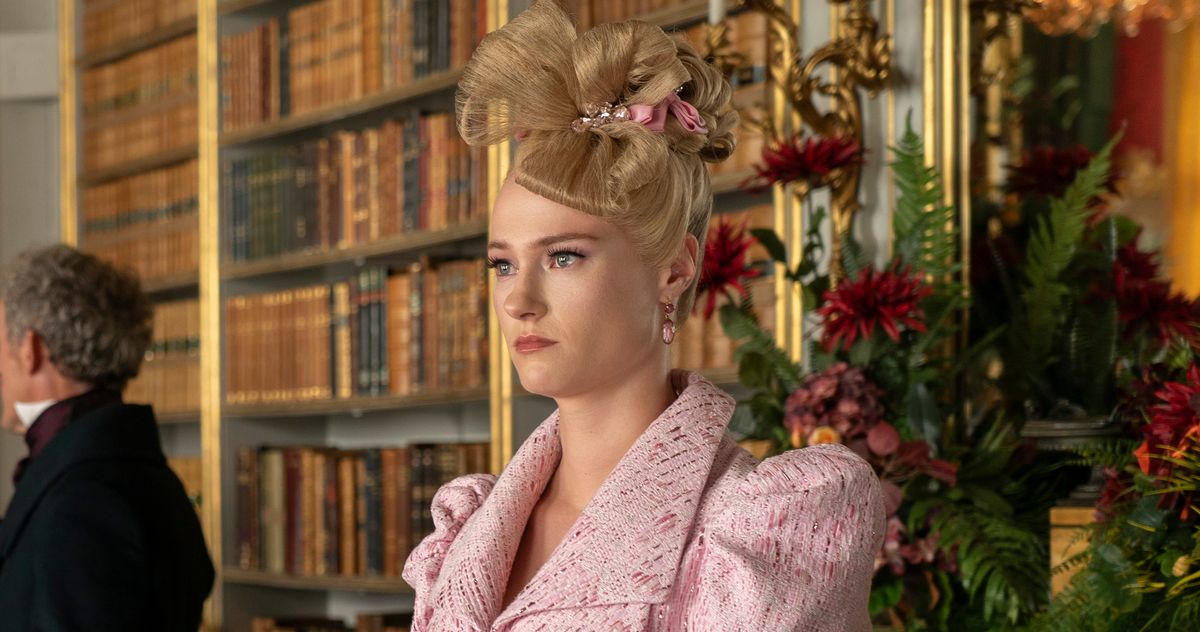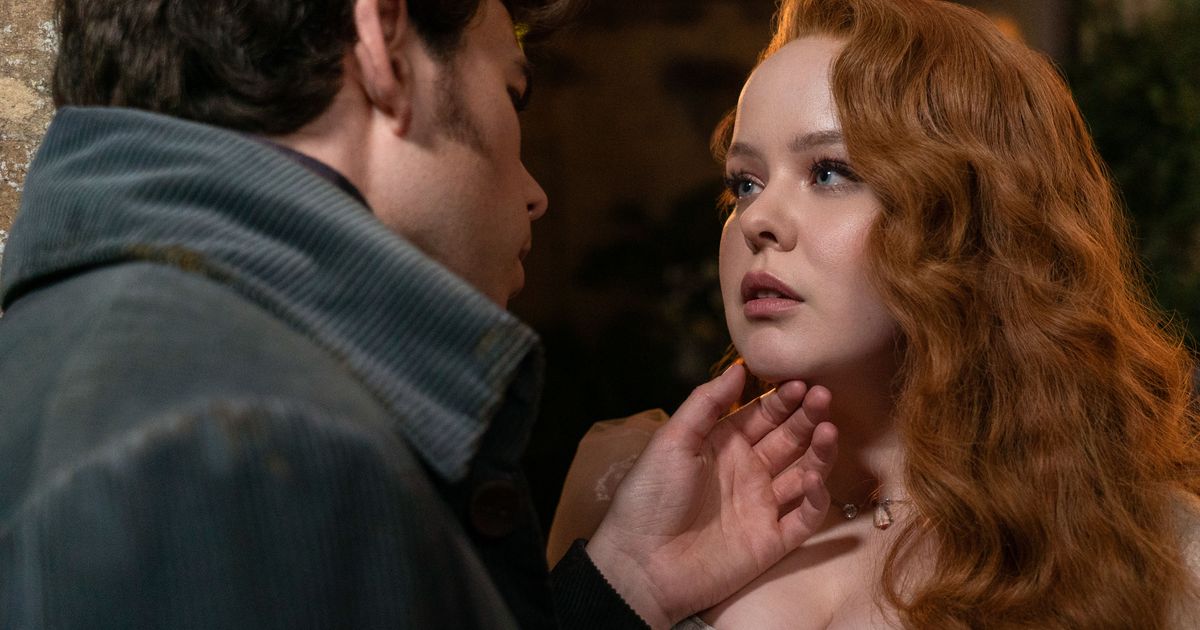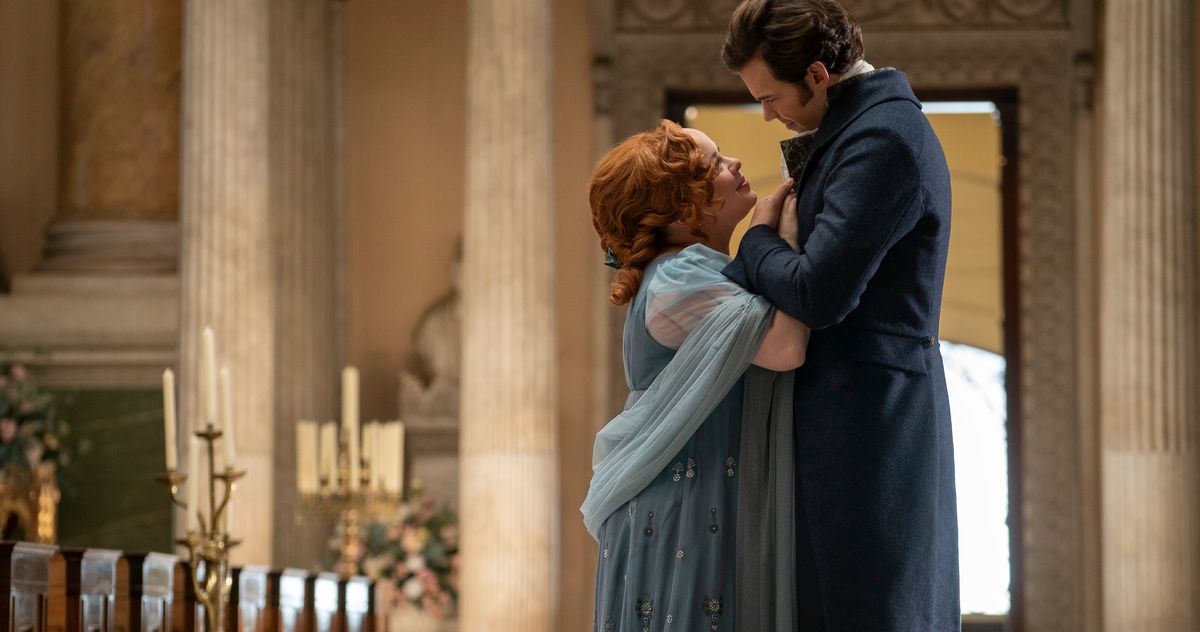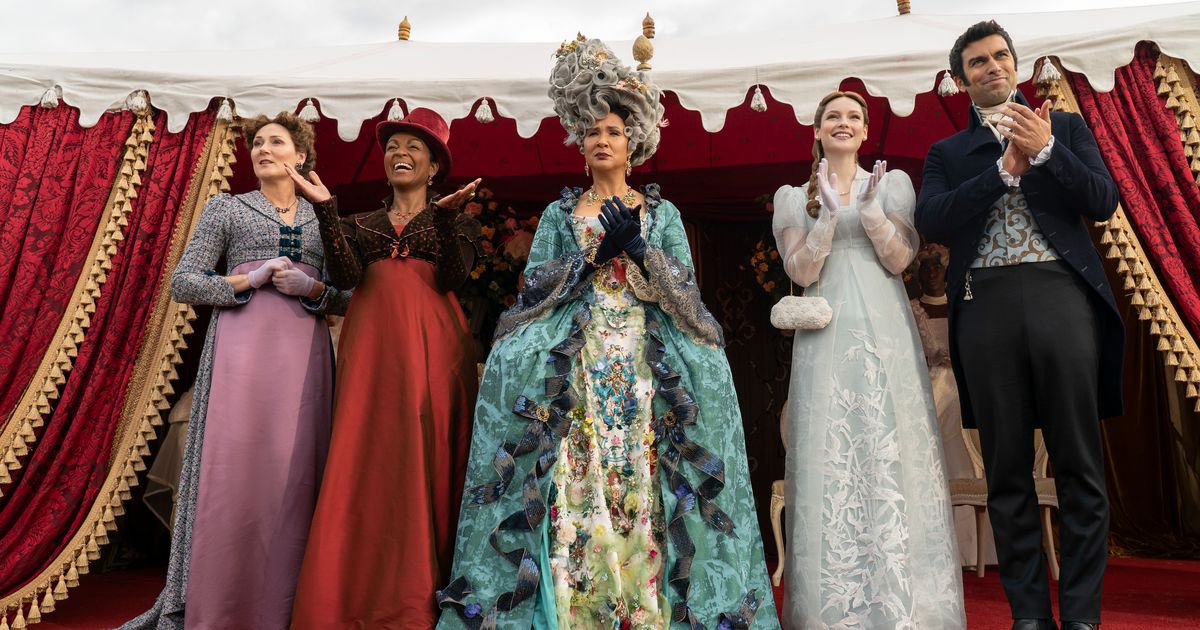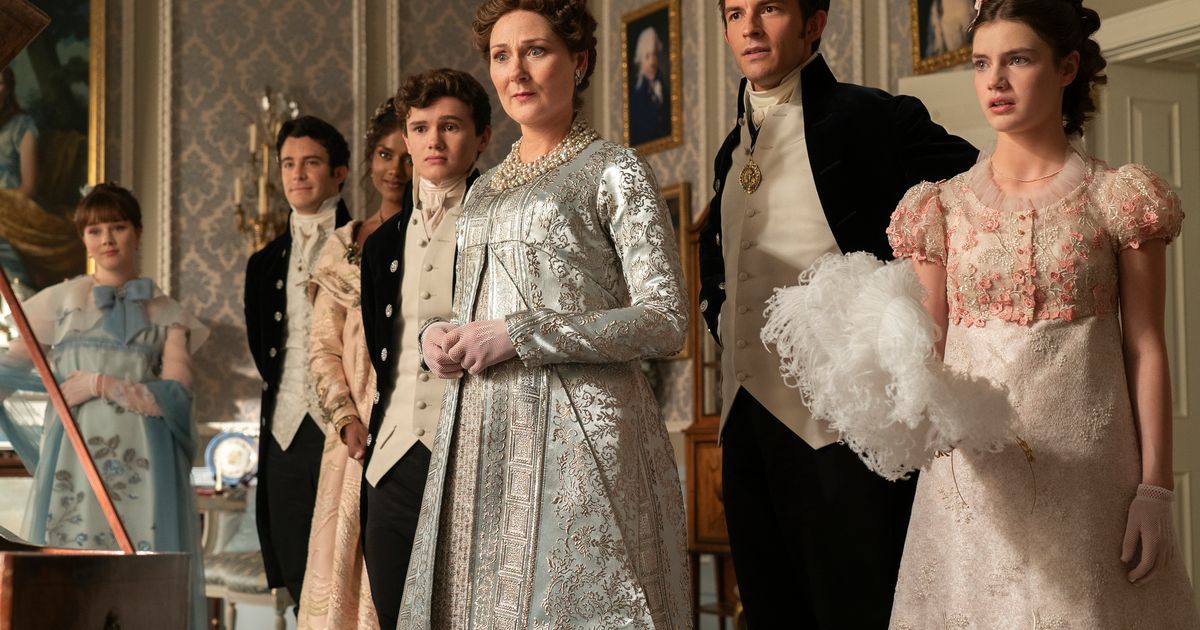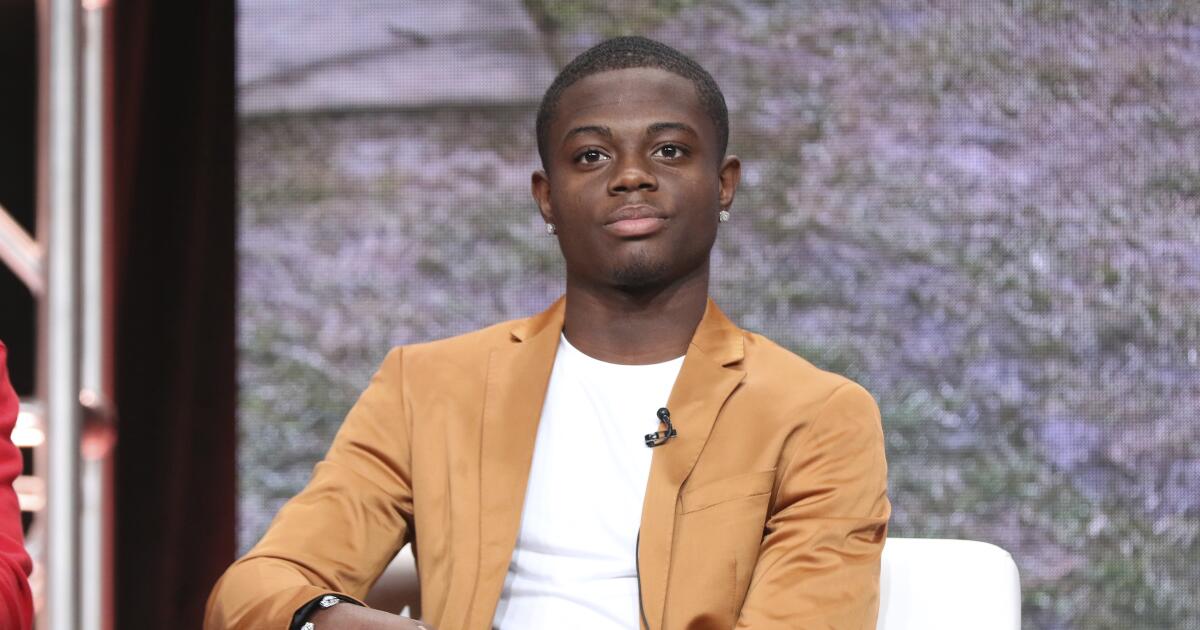“She’s alone. She doesn’t have another sibling who shares her family experience — she’s never had somebody to confide in or talk with.”
Photo: Liam Daniel/Netflix
Like the loose swan in Hot Fuzz, Cressida Cowper and her long, slender neck have been gliding through ballrooms, wreaking havoc while trying to find a mate, for three seasons of Bridgerton. At first, the well-dressed pain the ass seemed destined to be the show’s ultimate villain, honking at everyone while edging closer to spinsterhood with each failed year of marriage. But, as this current season reveals, our girl’s got some unpleasant emotional baggage that helps us better understand why she acts like this. Jessica Madsen’s character is the product of familial circumstances: an icy mother and unforgiving father who have no other children on which to fixate and have probably never said the words “I love you” to their daughter. “Getting away from her family is something that she really, really wants to do,” Madsen says. “And the only way she can do that is by marrying someone.”
Thanks to a new friend, though, Cressida begins to change her self-described “unkind” ways a little bit at a time. She and Eloise (Claudia Jessie) bond during a summer in the countryside, a relationship which continues back in London at the season’s various promenades and balls. Madsen believes their friendship, while unexpected, is genuine and one of the best things to happen to the insulated Cressida. It might even be transformative. “You have to be confident and in a safe place to be open,” she explains, “and it’s not safe around her apart from when she’s with Eloise.”
One of my favorite TV tropes is “let’s humanize this bitch.” Now that we’re privy to the circumstances around Cressida’s personal life, did it align with what you had assumed?
In some ways it did, and in some ways I had wonderful surprises. I remember stepping onto the set of the Cowper house for the first time like, Whoa. It really sunk in what was going on with her. I thought her house was going to be quite lavish, bright, and filled with velvet. I felt the seriousness of the situation. Both women in the house are controlled by a man. That was a wonderful contrast to what we’ve seen of the Cowpers the first two seasons, where they’re out and about and looking amazing and dressed in the best fabrics. There’s a sadness to their reality. It’s a heavy atmosphere.
I believe Cressida describes her house as a mausoleum.
We see her nursery and bedroom in the second half of the season, too, and they’re very dark and heavy spaces. It was a cool thing to see on Bridgerton, because, well, Queen Charlotte had some heaviness and reality to the darker side of things, and now we see that weight with the Cowpers. It reflects the time. These women were limited in what they could do and who they could be in life, and we see that in the family. I feel very sorry that she’s gone through this. I’m grateful there’s less of that in today’s world.
We see a lot of large families in the show’s universe; the Bridgertons have eight siblings and the Featheringtons have three. How does being an only child affect the way Cressida’s parents see her?
She’s alone. She doesn’t have another sibling who shares her family experience — she’s never had somebody to confide in or talk with. She doesn’t have any warmth with her parents. She grew up with coldness, hence why she’s cold to others. I do have other siblings, but they’re much, much older than me. I essentially grew up as an only child. I understood Cressida’s world when it came to that. But I had an awful lot of friends around me and I was very lucky.
There’s a lot of silence around her, so she’s not great at engaging with debutantes. You’re a product of your environment and sadly that’s what she has become up until this point. She puts on a sharp mask because a mask keeps her safe. She starts to shift because Eloise gives her so much kindness, and she feels safe. It’s not a shameful space. I think Cressida has a lot of shame, and when we hold shame, we can’t face ourselves or give ourselves grace, so we fight back. We don’t know how else to protect ourselves.
What does she feel ashamed of?
Any step she takes that’s a wrong step in her mother’s eyes makes her feel shameful of herself. Like, she failed her mom. Even that short moment in the second episode, we see a young lady bow in front of the queen and Cressida’s mom says, “If your bow had been lower and better, you might be married now.” You carry that. I didn’t do the thing I was supposed to do. You want to please your parents. We grow up and they’re our main caregivers. We want to please them because that’s how we survive — by having their love. It’s a toxic environment for her to be in.
Her sense of self has come from her mom and dad’s expectations. She’s really focused on trying to do the best for herself and what they would be happy with. She hasn’t thought much about herself and what she can do. We see her start to think about herself more with the friendship she has with Eloise, which shows she has the hope to start questioning things. When Lord Debling says, “I’m not fond of my family,” she’s like, Oh, wow!
It’s a turn-on!
A total turn-on. Let’s go! I can find someone who feels the same way I do! It’s an opportunity for Cressida to find somebody where she can be happier. That excites her and that’s what Lord Debling represents. My life can actually be different. I don’t think she has a full understanding of what love really is, because she’s never seen love between her parents. Love isn’t necessarily in her vocabulary. She grows a love for Eloise as a friend, so hopefully, in her future, there’s a chance for her to find love.
Why do you think she’s had such a difficult time finding a husband?
She’s not genuine. She’s going by the book and putting on a front in the first two seasons. Her mom’s in her ear all the time, metaphorically and literally. She’s following and performing that narrative, and not opening up herself and properly connecting with people because of it. There’s a fault in her way of connecting until she has this friendship with Eloise. If Cressida had this type of friendship years ago, I’d like to think she’d be in a completely different place.
Bridgerton often presents romantic relationships in the dichotomy of head versus heart, but friendships aren’t allotted the same level of analysis. Cressida admits to Eloise that it’s been a greater challenge, even above romance, for her to find female friends.
It’s true. As it progresses, things happen between them, but I find their friendship to be a genuine one. These girls are pitted against each other because they’re in a race to find a husband. They’re racing each other for the win. This is Cressida’s third season out because she hasn’t come close to winning. We see more and more weight put on these girls as time goes on. They’re in competition with each other, which is a really hard place to be. If you think you’re in a competition with someone else, it’s hard to have a friendship. That goes for any day and age. Women need to open up and connect with each other and be on each other’s sides.
Does Cressida even want to marry? Is she secretly self-sabotaging?
She wants to marry because that’s what she sees as the next step in life. You grow up, you marry, and that’s how it is. She hasn’t questioned any other options like Eloise and Penelope have. All she knows is what her mom has fed her into believing is the right step for her. When she does marry, it opens up a new world for her. She’ll get out of her house. That’s the first step: Get me out! She doesn’t want to end up with someone who’s her father’s friend, but she wants to get out. With Lord Debling, she sees she could find someone who’s like-minded.
Where does Cressida sit on the spectrum of villains for you? Is that a fair characterization?
I’ve always loved a villain. Look at the Disney villains. Give me Cruella de Vil or the witch in Snow White any day. They’re fascinating characters. But Cressida isn’t a villain in my eyes by any means. She’s a young girl trying to do her best with very limited information about life and a difficult childhood. She’s doing her best with the blueprint she’s given. It’s so complex what Bridgerton has done — I mean, there’s always movement with Cressida and she fluctuates; her sharpness and softness is part of her character. This season we’ve caught her during a time when she’s letting go of her toughness, that exterior is melting away, and she’s opening up. There’s a huge vulnerability under there. She’s struggling to balance the two.
Cressida has some of the most rigid and strangely contoured clothes on the show. Were you given deeper meaning to her sartorial preferences?
They’re amazing costumes and bring her to life. Putting them on is such a gift. They have a beautiful structure this season. We see her in this very dark house with a pink dress and roses around her neck, but she still has a sadness to her. I found the juxtaposition quite funny. Did you notice how she has beautiful coats this season? She’s maturing and getting older. I always envied Adjoa Andoh’s coats, and Cressida finally got to wear some. I felt like she’s coming into being a woman, growing up, and developing in a cool way. That’s shown in the clothes. I kept the corset this season because I love it. A lot of people didn’t wear corsets this time around, but for Cressida, I feel like she is a corset. She gave me a lot to work with.
That’s a lovely analogy.
She totally is. She’s a corset for herself, she’s corseted by her family, and society is a huge corset for all of the women on the show.
The neck corset was spectacular. You know Zara will be producing a knock-off in a few weeks.
Why stop there? Go couture. John Galliano.




